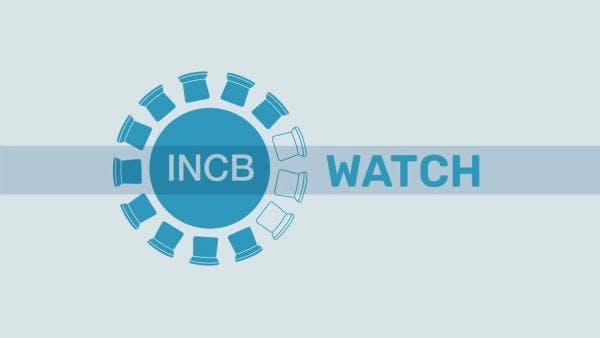INCB focuses on access to pain medication in 2014 Annual Report
The International Narcotics Control Board (INCB) today launched its Annual Report for 2014, accompanied by a Press Release that offers an overview of its contents.
In keeping with the prominence accorded under the watch of current INCB Present Dr Lochan Naidoo to the enabling principle of the international drug control conventions, which seeks to ensure access to controlled drugs for medical and scientific purposes, the Press Release headline tells us that 'Three quarters of the world has limited or no access to pain relief medications'. The Report also contains calls for countries to demonstrate greater respect for human rights, as well as the abolition of the death penalty for drug-related offences.
While it is possible to view these statements cynically as 'mere words', in fact the public discourse of the organs of the drug control system forms an integral part of its work, and can have a powerful impact on policies and practices carried out in the name of drug control. These calls from the INCB also represent the outcome of a protracted and complex struggle to change the ways in which the system functions and, while there remains a long way to go, should be welcomed.
That said, it must be recognised that these positive trends are once again undermined by the Board's continued failure to achieve a balanced analysis in concrete practical contexts in which the enabling elements of the conventions need to be applied. The most glaring current example of these is represented by the case of ketamine, particularly since the Report contains a section dealing specifically with the availability of controlled narcotic and psychotropic drugs in humanitarian emergency and conflict situations. These are among the situations in which ketamine is uniquely effective.
Briefly, ketamine is an anaesthetic which is relatively cheap, safe and easy to use, and is often the only anaesthetic available to enable surgery in rural contexts in developing countries. China has set in motion the process to bring ketamine under international control by including it in schedule one of the 1971 Convention on Psychotropic Substances – the most restrictive schedule. Such a measure could deny anaesthesia – and by implication, surgery – to an estimated two billion people. The INCB has been advocating and manoeuvring for the international control of the substance for several years, and during that time has given no space to its great therapeutic utility. The tradition is continued in this year's Annual Report, which while reiterating concerns about its nonmedical uses in various parts of the world, contains no mention whatever of its importance for rural areas of the developing world.
The overarching support for the availability of access to essential medicines that features in this year's Annual Report from the INCB is encouraging; but the INCB must direct its attention to what such support must mean on the ground, in those real places where pain is suffered.
Keep up-to-date with drug policy developments by subscribing to the IDPC Monthly Alert.
Topics
Regions
Related Profiles
- International Drug Policy Consortium (IDPC)
- International Narcotics Control Board (INCB)
